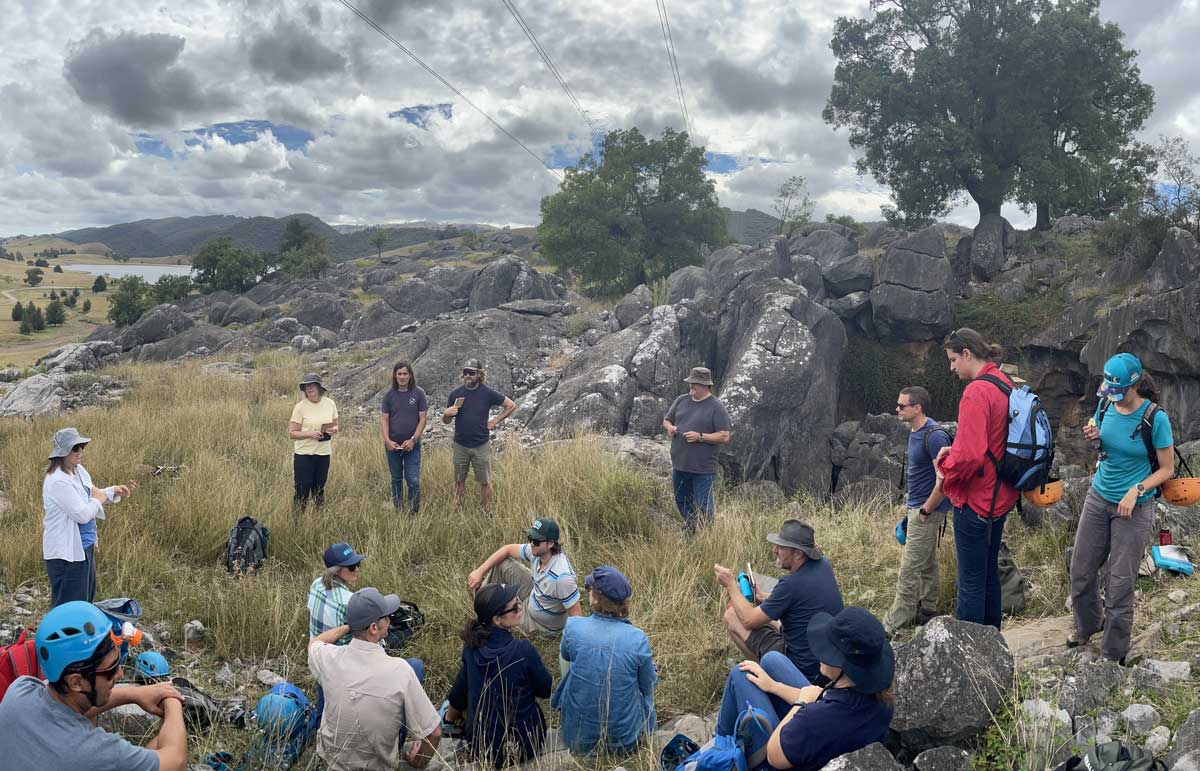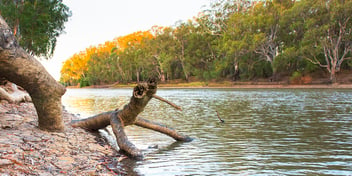The Power of Connecting to Country and Place

Nicole Vonarx, Former President of the ACT Branch Committee and Manager of Engineering Services at Icon Water presented her personal experience on Connecting to Country during the ACT Water Matters Conference.
Nicole Vonarx from Icon Water began her session with a call to action for delegates to think more about their personal connection to water and their motivation and purpose as water professionals in the space.
Nicole hopes to encourage further involvement and collaboration in the ACT space with water professionals and First Nations peoples to achieve a sustainable water future. To do so, Nicole relays that we need to reassess our relationship towards water.
“As water professionals, we think of how we manage water. But how do we think of our relationship with water?”

Nicole asked delegates to reflect on the following questions:
- Where do you find your greatest sense of place?
- Where do you feel nurtured and supported?
- What is the place that you understand best, that knows you best?
- How do you connect with this place?
- How do you care for this place and how does this place care for you?
“The water sector is a wonderfully connected industry already, and as such has an incredible opportunity to walk together with First Nations people to do this. We just need to be open to different ways of knowing, and today I come with an open heart and a little bit of courage to share my stories and experiences of immersion, connection, and unlearning”, said Nicole.
Peter Cullen Trust
“To give you context of the immersive process that we went through, the Connection to Country program is part of the Peter Cullen Trust, and so many would be familiar with the Peter Cullen Trust Water to Science Policy Leadership courses that they run. This year was a pilot program of Connection to Country”.
The Peter Cullen Trust Connection to Country program was dreamed up by a cohort that were part of the broader [Peter Cullen Trust] program in 2022 consisting of 20 people from a number of different cohorts that attended the trip, and it was focused on the Northern Basin in the Kamilaroi Country.
During the trip, Nicole and the cohort visited Bindiwoolool, or the Macquarie Marshes, and were provided with some interesting perspectives from convening water users. The Northern Basin is an overly-extracted area of the Murray-Darling Basin, and is often forgotten. They heard from local farmers who work closely with the traditional owners to manage their land.
“We heard from cotton farmers who spend a lot of money creating artificial wetlands that appear beautiful, but on the other side of the road, there is a desolate paddock”, said Nicole.
“From there, we travelled to the Garragundi, or the Gwaii Wetlands, where local Kamilaroi, Gamaroi, Gomeroi woman, Kerry Saunders of the Yinnamar Bush Tucker, showed us the paddy, gave us a lesson in native grasses, and showed how the seeds could be used for flour, and gave us samples of her Mitchellgrass flour made into demigod with lily collagen.”
Connection to Country
During the trip, Nicole also travelled to Ngunu and Dhariwa, which was a particular highlight for her.
“I wanted to visit the fish traps for years, and with Kuma Mawari and Iwalora man, Kamilaroi man, Brad Hardy, providing an entertaining yarn that did not disappoint. And the day just got better when we got to spend time at Jason's place at Dhariwa on Aran Lakes, where he shared stories of the creation ancestor and his two wives, who were eaten by Gariya, and in their battle, the lakes at Aran were formed. That night, we were treated to a stargazing experience”, said Nicole.
The immersive experience on country, guided by Jason, allowed Nicole and the cohort to create genuine connections with the people, the land, and the water. During our trip, Nicole and the cohort were challenged to find the place that created that spiritual connection for them.
For Nicole, this was something that she felt at Ngunu, the fish traps.
“I loved seeing them, but there was still so much more to them than just the structure and the function, which alone are pretty impressive. The seas and use of capturing the fish, storing the fish, and releasing, only keeping what is needed for the community. But what we learned of their significance to the people, not just for the fish they provided, but as they were used as a meeting place, shared by eight different tribes with eight different languages.” Said Nicole.
“Our education has taught us to read and see from a Western perspective, that sometimes we need to forget what we have learned and open our hearts and minds to see things in another way. Too often our Western perspectives limit us to what is written, logical, structured, yet often the beauty lies in the space in between".
To be able to truly look at things from a different perspective, we need to unlearn what we've been taught.
Learning to unlearn
“As non-Indigenous water custodians, I challenge you all to rethink your relationship with water. Seek the opportunity to fully immerse yourself in country. Find your connections, both on the country you live and work, also more widely across the country that is so connected by the waterways we interact with. And be comfortable with unlearning.” Said Nicole.
“This will enable us to open our hearts and eyes and see water as gullible. Country does not separate the land from the water or from the spirit. They all must be one. Having an open heart and open mind creates the opportunity for connection of the spirit to the land, water, highlighting the deep relationship between people and country”.
The ACT Water Matters Conference is proudly sponsored by:






